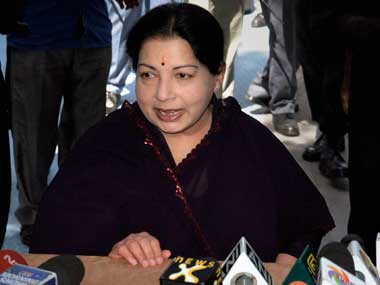The Supreme Court, in its wisdom, granted convicted former Tamil Nadu Chief Minister J Jayalalithaa bail and temporarily suspended her conviction for corruption. Her party faithful, in their unwisdom, have been busy celebrating the mere grant of bail as some kind of vindication.
What all this proves is that we are far from being a society driven by the rule of law where even conviction does not seem to matter to politicians and their fans. Rather, a legal conviction is seen as being the result of vendetta by politicians or other enemies.
However, there is every possibility that the Jayalalithaa case could prove to be a turning point in how the public starts viewing political crimes at the highest level. In fact, it could herald the beginning of the end of the old way of politicians gaming the system by seeking endless adjournments and delays. Lalu Prasad, now out on bail in the fodder scam, had better watch out.
The Supreme Court’s bail to Jaya is not a legal licence to delay and litigate endlessly till the cows comes home. In fact, the reasons for the bail are two-fold: her health, and the possibility of delays in handling her appeal by a Bangalore court.
The Supreme Court effectively squelched any possibility of Jaya using her bail to prolong the process of appeals and legal delays. For the key condition it imposed while granting bail was that her lawyers would not seek adjournments while getting their appeal heard at the Karnataka High Court, which last week had denied her bail or even a suspension of the sentence.
Jaya was convicted and sentenced to a four-year term by special judge John Michael D’Cunha on 27 September and has spent her time in jail since then. The judge also fined her Rs 100 crore and barred her from holding elective office for 10 years.
The reason why her case could signal a shift in the legal climate against corruption is simple: delays are no longer likely to be tolerated by the courts.
The Jaya case took 18 long years and a shift of the case outside Tamil Nadu to reach a verdict. The Supreme Court has now made it clear that further delays are not conscionable.
The two key undertakings her lawyer had to make while successfully pleading for her bail were that she would stay put in her Chennai residence and rein in her followers, and that her lawyers would do nothing to delay the case. Her counsel Fali S Nariman promised that “no delay would be caused while the appeal is heard by high court. It is not a game. It may have been a game before. You can record my statement.”
Here is her lawyer admitting on record that earlier delaying tactics were part of the game. Now they will not be.
The court accepted this promise, but made its own promise that “we will not give you a day more if you fail to file a paperbook (final detailed appeal) within two months.”
Net-net, this means the Karnataka High Court will have to hear Jaya’s appeal quickly, and Jaya won’t seek adjournments. The hearings could conclude latest by January-end or February 2015. Her conviction will be upheld or modified in less than four months from now.
Even otherwise, the Supreme Court itself set a process of speeding up cases against politicians in March, when it said that cases against legislators which attract disqualification under Section 8(1), 8(2) and 8(3) of the Representation of the People Act should be completed within a year of charges being framed.
The home ministry under Rajnath Singh has moved quickly to get states to play ball on this score. It wrote to states: “Once any case has been identified, then the assistant public prosecutors/public prosecutors will move a prayer before the magistrate/sessions judge concerned seeking a fast track trial of the case on a day-to-day basis in compliance with the above mentioned order of the Supreme Court.”
The Supreme Court order in the Jayalalithaa case now takes this process one step further. After conviction, the politician concerned will not be allowed to delay the process through repeated appeals and adjournments. The high courts, too, are taking a dim view of politicians using bail for political purposes. Last week, Om Prakash Chautala was sent back to prison after he was found campaigning for the Haryana assembly polls when he had got bail on health grounds.
While the Supreme Court’s order applies only to the Jaya case, future public litigants will surely cite the order in her case to get all courts to impose time limits for ending the process of appeals.
The Jayalalithaa case will make it more and more difficult for politicians to take the legal system for a ride in future.


)




)
)
)
)
)
)
)
)